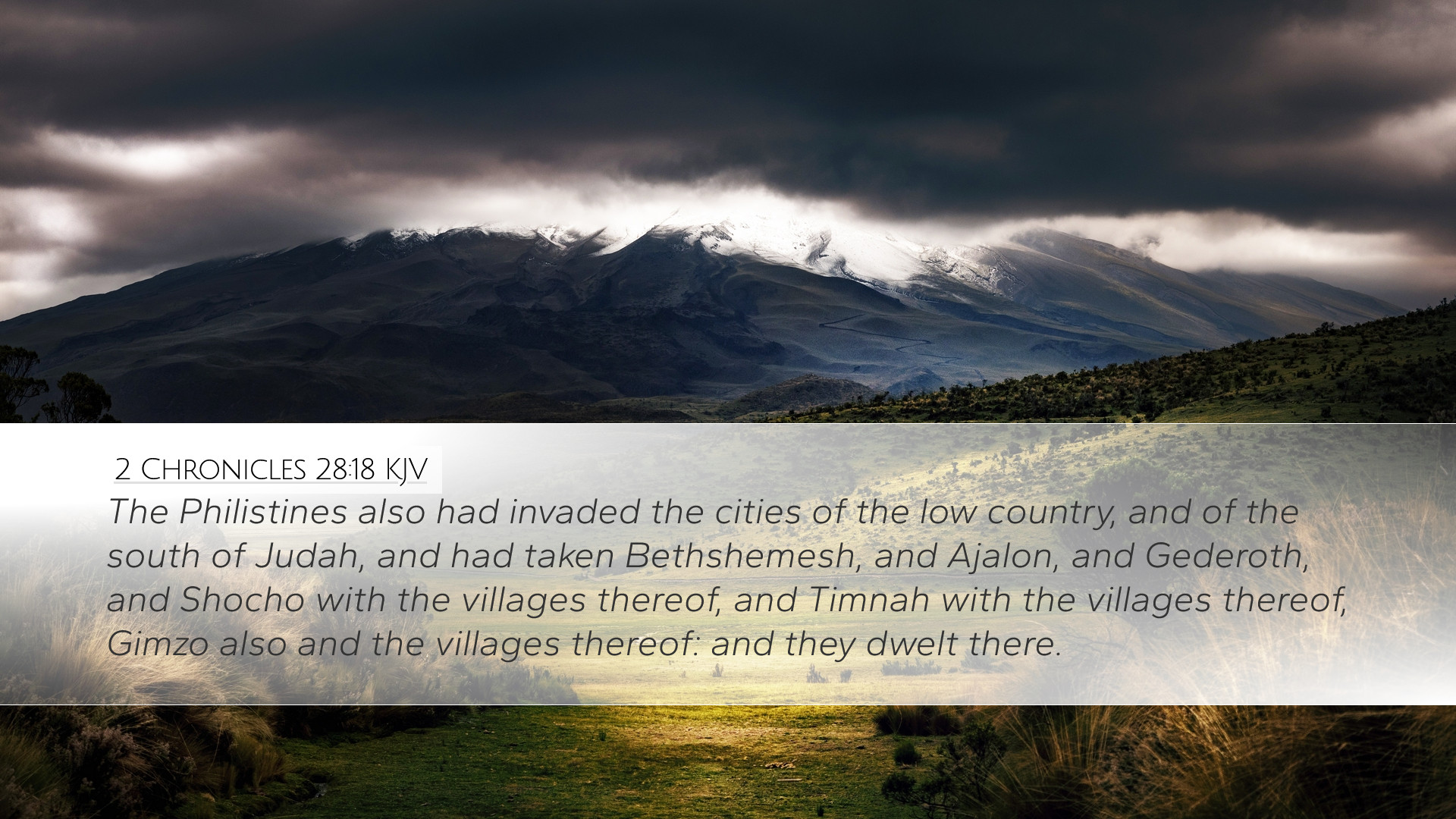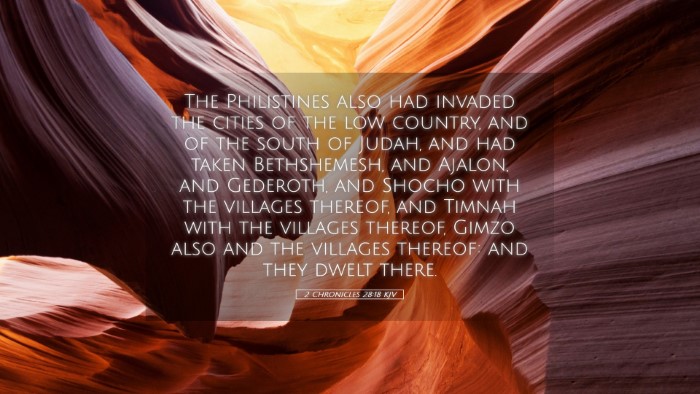Commentary on 2 Chronicles 28:18
Verse Reference: 2 Chronicles 28:18 - "The Philistines also had invaded the cities of the low country, and of the south of Judah, and had taken Bethshemesh, and Ajalon, and Gederoth, and Shoco, and Timnah, and Gimzo: and they dwelt there." (KJV)
Contextual Overview
This verse falls into a complex historical narrative that illustrates the tumultuous period of King Ahaz's reign over Judah. The chronicler delineates a time fraught with military conflicts, idolatry, and divine judgment. It is imperative to understand the surrounding details about King Ahaz's character and the challenges faced by Judah during his kingship.
Historical Background
A focused analysis reveals that King Ahaz was a product of a deeply troubled political environment. He aligned himself with external powers rather than trusting in the Lord. The invasions of the Philistines during Ahaz’s reign serve as a significant facet of the narrative, showcasing the downfall of a nation when it deviates from reliance on God.
Insights from Commentaries
Matthew Henry's Commentary
Henry highlights that this invasion by the Philistines marks the fulfillment of prophetic warnings against Judah's sinfulness. In his commentary, he notes:
- Divine Judgment: Henry emphasizes that the cities captured were once under the protection of God but were now vulnerable due to Judah's transgressions. He interprets this as a clear signal of divine judgment.
- Call to Repentance: The calamity that befell the southern regions serves as a call to the people of Judah to return to their covenant with God, drawing parallels with the importance of repentance in times of national crisis.
Albert Barnes’ Notes on the Whole Bible
Barnes sheds light on the geographic details of the captured cities, which holds significance for understanding the strategic realities of that time. He suggests:
- Territorial Loss: The loss of these cities illustrated the weakening of Judah's political power and divine favor. The Philistines’ encroachment into the lowlands reflects their opportunistic nature in exploiting Judah’s demise.
- Spiritual Decline: Barnes correlates military struggles with spiritual turpitude, suggesting that external invasions were permitted by God to discipline His people who strayed into idolatry.
Adam Clarke's Commentary
Clarke provides a detailed analysis of the specific locations mentioned in the verse. His interpretations include:
- Symbol of Decline: The captured cities symbolize not only loss but also abandonment of God’s command and protection, representing a wider spiritual decline among the people of Israel.
- Philistines' Strategy: Clarke notes the Philistines had taken advantage of the chaos within Judah, elucidating that their strategy was both military and psychological; they aimed to instill fear and promote disillusionment among the Israelites.
Thematic Elements
Consequences of Idolatry
The overarching theme of 2 Chronicles 28:18 is the grave consequences of idolatry and abandonment of God’s covenant. Each commentator underscores the point that spiritual infidelity leads to national vulnerability and breakdown. This lesson remains timeless—blurring the lines between spiritual health and national stability.
Divine Sovereignty and Human Responsibility
This narrative serves to highlight the tension between divine sovereignty and human responsibility. Ahaz's choices and resultant actions invite theological reflection on how human decisions relate to divine providence. Each commentary elucidates the point that while God permits judgment, it often arises out of human disobedience.
Conclusion
In summary, the verse 2 Chronicles 28:18 encapsulates a profound lesson on the results of national disobedience and the implications of disintegrating faith in God. The insights from Henry, Barnes, and Clarke collectively emphasize that the plight of Judah serves as both a cautionary tale and a call to a renewed understanding of our covenant commitment to God. For pastors, theologians, and scholars, these themes resonate beyond the historical narrative, calling for reflection on the contemporary faith experience and societal conditions.


